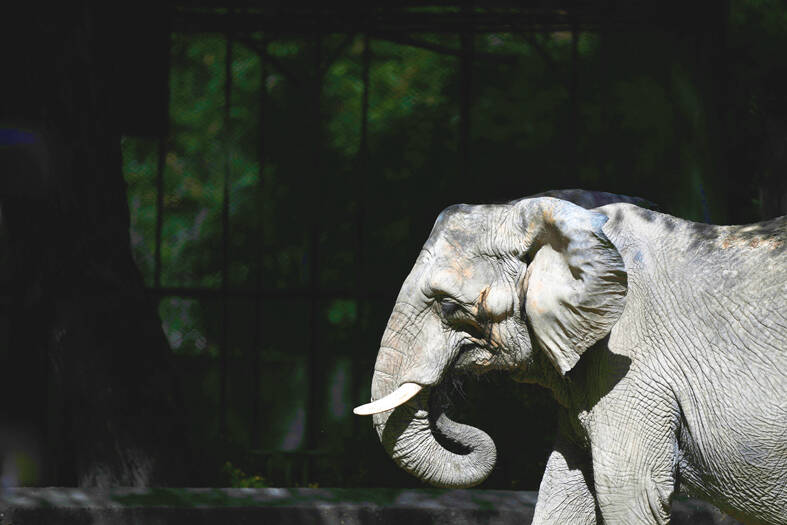Pupy the elephant arrived at her new home in a sanctuary in Mato Grosso, Brazil, yesterday, following a 2,700km overland journey from a zoo converted into an ecological park in Argentina’s capital where she had spent 30 years in conditions criticized by activists.
The Buenos Aires mayor’s office in a statement said that the last elephant living in the Argentine city’s “Ecopark” arrived at her destination in Brazil’s Amazon rainforest “in perfect health.”
The 35-year-old African elephant was transported in a large iron crate with thick bars strapped to a truck, a mission for which she had been trained for several months. The truck was flanked by vans filled with caretakers and veterinarians.

Photo: AP
Pupy (pronounced POOH’-pee in Spanish) did not require sedation during the five-day journey to Elephant Sanctuary Brazil, the first refuge for elephants in Latin America located in the municipality of Chapadas Dos Guimaraes in Mato Gross state, Argentine authorities said.
Upon arriving at the sanctuary, her veterinary escorts opened the door for her, but Pupy was reluctant to leave the iron crate. They said they fed her sugarcane and watermelon, her favorite food, and gave her a bath to refresh her.
Pupy is to remain in an outdoor shed while she begins to adapt to her new home, without rushing.
“Everything will happen at her own pace,” the Buenos Aires mayor’s office said.
Buenos Aires in 2016 launched the transformation of its century-old urban zoo in Palermo neighborhood into an ecological park for the preservation of biodiversity and the conservation of native species.
As part of this process, more than 1,000 animals — including lions, tigers, bears and apes — have been relocated to other countries where they enjoy better living conditions.
An emblematic case was that of the orangutan Sandra, who now lives at the Great Ape Center in Wauchula, Florida, where she has adapted and has friends of her own species.
Pupy, who arrived at the Palermo zoo in 1993, is the latest animal transferred from the Buenos Aires ecological park.
Already enjoying the Brazil Elephant Sanctuary are five Asian elephants — including Mara, a former circus elephant that also ended up in the Argentine preserve’s enclosure and five years ago made the same highway trip to the refuge, where she now trudges at least 10km a day.
Pupy would not be reunited with Mara in her new home, “due to the natural differences between the two species,” officials said.
“The sanctuary is designed to keep the groups separate, respecting their biological and behavioral needs,” it said.
The Buenos Aires “Ecopark” would continue to house animals that, due to age or logistical impossibility, cannot be transferred to another habitat.

DISASTER: The Bangladesh Meteorological Department recorded a magnitude 5.7 and tremors reached as far as Kolkata, India, more than 300km away from the epicenter A powerful earthquake struck Bangladesh yesterday outside the crowded capital, Dhaka, killing at least five people and injuring about a hundred, the government said. The magnitude 5.5 quake struck at 10:38am near Narsingdi, Bangladesh, about 33km from Dhaka, the US Geological Survey (USGS) said. The earthquake sparked fear and chaos with many in the Muslim-majority nation of 170 million people at home on their day off. AFP reporters in Dhaka said they saw people weeping in the streets while others appeared shocked. Bangladesh Interim Leader Muhammad Yunus expressed his “deep shock and sorrow over the news of casualties in various districts.” At least five people,

LEFT AND RIGHT: Battling anti-incumbent, anticommunist sentiment, Jeanette Jara had a precarious lead over far-right Jose Antonio Kast as they look to the Dec. 14 run Leftist candidate Jeannette Jara and far-right leader Jose Antonio Kast are to go head-to-head in Chile’s presidential runoff after topping Sunday’s first round of voting in an election dominated by fears of violent crime. With 99 percent of the results counted, Jara, a 51-year-old communist running on behalf of an eight-party coalition, won 26.85 percent, compared with 23.93 percent for Kast, the Servel electoral service said. The election was dominated by deep concern over a surge in murders, kidnappings and extortion widely blamed on foreign crime gangs. Kast, 59, has vowed to build walls, fences and trenches along Chile’s border with Bolivia to

DEATH SENTENCE: The ousted leader said she was willing to attend a fresh trial outside Bangladesh where the ruling would not be a ‘foregone conclusion’ Bangladesh’s fugitive former prime minister Sheikh Hasina yesterday called the guilty verdict and death sentence in her crimes against humanity trial “biased and politically motivated.” Hasina, 78, defied court orders that she return from India to attend her trial about whether she ordered a deadly crackdown against the student-led uprising that ousted her. She was found guilty and sentenced to death earlier yesterday. “The verdicts announced against me have been made by a rigged tribunal established and presided over by an unelected government with no democratic mandate,” Hasina said in a statement issued from hiding in India. “They are biased and politically motivated,” she

It is one of the world’s most famous unsolved codes whose answer could sell for a fortune — but two US friends say they have already found the secret hidden by Kryptos. The S-shaped copper sculpture has baffled cryptography enthusiasts since its 1990 installation on the grounds of the CIA headquarters in Virginia, with three of its four messages deciphered so far. Yet K4, the final passage, has kept codebreakers scratching their heads. Sculptor Jim Sanborn, 80, has been so overwhelmed by guesses that he started charging US$50 for each response. Sanborn in August announced he would auction the 97-character solution to K4